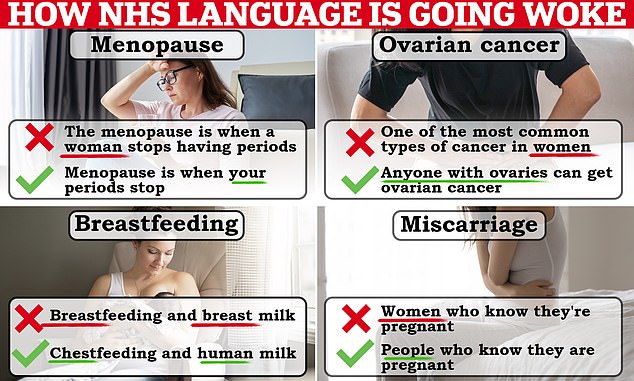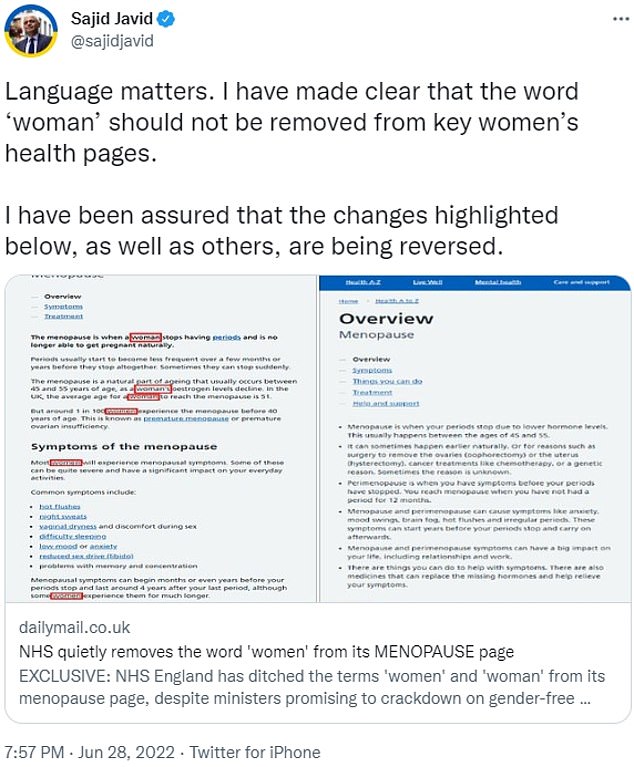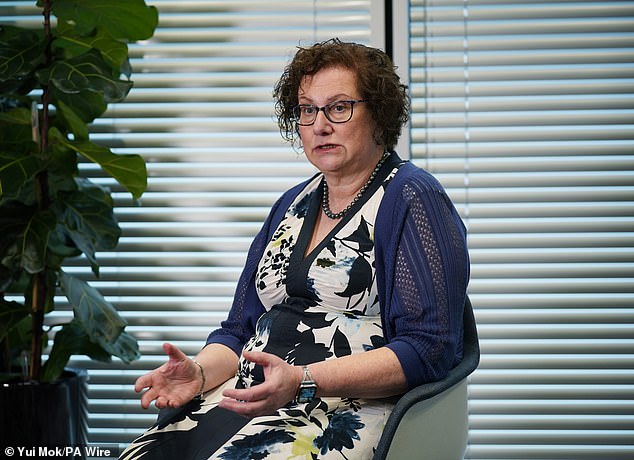After multiple scandals, repeated warnings from experts and a revolving door of health secretaries, the NHS will finally be able to stop the “eradication” of the term woman and the use of “artificial language”.
Health Secretary Victoria Atkins has today announced proposed changes to the NHS Constitution, a document that enshrines what the health service is dedicated to achieving, in terms of recognizing the importance of biological sex.
Discussing the changes, Ms Atkins said the language the NHS uses should “be clear and make sense to people”, and not “eradicate women”.
She told Times Radio: “There will be listeners who will be concerned about seeing articles in the newspaper about ‘breastfeeding’ and language like that.”
The change in attitude is also accompanied by proposals to ensure that trans patients only use single-sex rooms and that patients have the right to request intimate care from a doctor of their own sex.
Here, MailOnline explains how we got here amid years of scandals and multiple promises.
Health and Social Care Secretary Victoria Atkins (pictured) said: “If a patient wants same-sex care, they should have access to it wherever reasonably possible.”

Below are some examples of the changes in woke language that have affected NHS communications. Some of these examples have been taken from national NHS communications, whilst others are used by individual hospitals.
While examples of individual NHS trusts deleting or avoiding terms such as women on local councils had previously come to light, in 2022 it became a national issue.
MailOnline revealed that NHS Digital had quietly removed all mention of women from its ovarian, uterine and cervical cancer home pages.
The previous version of the NHS ovarian cancer page included the following sentence: “Ovarian cancer, or ovarian cancer, is one of the most common types of cancer in women.”
This had been replaced with “Anyone with ovaries can get ovarian cancer, but it mainly affects those over 50.”
Then, just a few weeks later, this website revealed that “women” and “female” had also been omitted from official advice on menopause, which is exclusive to biological women.
The website previously described the condition as “when a woman stops having periods and can no longer get pregnant naturally.”
But the new, gender-neutral description said: “Menopause is when periods stop due to lower hormone levels.”
In total, six mentions of “women” and “woman” have been removed from the page.
To justify the change, NHS Digital said at the time they wanted the language to be “inclusive and respectful”.
The move was condemned by then Health Secretary Sajid Javid, who said “common sense and correct language” should be used to “give people the best possible care”.

In 2022, Sajid Javid vowed to reverse gender-neutral language in NHS advice after MailOnline revealed the term “woman” had been quietly deleted from menopause advice.

Dr Cass’s report (pictured) concluded this week that trans children were on course for irreversible change despite “remarkably weak evidence” supporting medical treatment.
Health experts criticized the gender shift in language and warned that vital health advice for women was being overly complicated.
Another example, which was reversed following the backlash, was the NHS miscarriage page.
In the change, NHS officials had replaced “women who know they are pregnant” with “people who know they are pregnant”.
Another line on the page was also criticized for saying that miscarriage “only affects one in 100 people” rather than women.
However, that was not the end of the scandals.
That same year, the NHS came under fire for new “ideological” advice for trans parents that did not mention the word “breast”.
A page titled “Breastfeeding if you’re trans or non-binary” does not mention breasts and refers to breast reduction operations as “top surgery.”
The guidance also encouraged people to continue taking hormonal transition medicines when “breastfeeding”, despite the NHS admitting it is “unclear what effect this might have on your baby”.
Although it was drafted a year before publication, the advice was only published online after almost 12 months of internal NHS wrangling.
Even the final version sparked concern among nurses and maternity experts, who said it fails to warn people about the health risks of such practices for both parents and babies.
In October 2023, then Health Secretary Steve Barclay announced his intention to reverse the tide of “ideological” inclusive language in the NHS.
She criticized the “unacceptable” use of gender-neutral language on advice pages for women-only conditions such as cervical cancer.
As a result of his intervention, sex-specific language has been “fully restored” in the offending health sections, he said.
Barclay also revealed he was “going further” by revealing proposals to ban trans women (biological men who identify as the opposite sex) from using women-only hospital wards.
She argued that it was vital that “women’s voices are heard” and that “the privacy, dignity and safety of all patients is protected.”
Amid these language scandals, another NHS controversy was being addressed: standards and quality of care that called into question the gender of children.
It was not until earlier this year that the compelling findings of the Cass review exposed the “shaky foundations” of the NHS’s treatment of transgender people.
Led by renowned paediatrician Hilary Cass, it found that vulnerable children questioning their gender have been “let down” by doctors who have used “remarkably weak evidence” to hand out life-altering treatments such as puberty blockers.
While the mammoth 400-page report did not focus on the language used in the NHS, it brought much-needed clarity and focus to a controversial, exceptionally toxic and murky area of modern medicine.
It also highlighted how radical changes to health practices were being made in the name of gender inclusion and were not supported by evidence.
Following the report, the NHS announced it would launch a similar wide-ranging review into care services for trans adults.
This will serve as a ‘Cass, part two,’ he said, covering the entire field.
The proposed changes to the NHS Constitution have not been finalized and will be subject to an eight-week consultation ending on June 25.
However, they have already been widely welcomed by women’s rights groups and gender-critical feminists.
Maya Forstater, chief executive of Sex Matters, a human rights charity fighting for clarity about sex in law, policy and language, said: “Victoria Atkins’ explicit reference to biological sex is very significant.”
‘It will benefit anyone who needs same-sex intimate care in NHS England, or who may need it in the future.
“We can expect an indignant response from trans rights activists, but this is simply a return to common sense and a belated recognition that women’s well-being and safety are important.”

